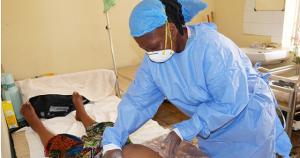Giving back after Ebola
Before the Ebola virus arrived in Freetown, Sierra Leone, hospital nurse Adiatu Pujeh and her colleagues at the King Harman Hospital thought malaria was the most challenging disease they faced. But Ebola, which arrived in their midst last September, infecting Adiatu and killing many of her colleagues, changed all that.
"We had been treating all sorts of common cases here, including the number one killer disease – malaria – before the Ebola outbreak," says Adiatu. But in September, a patient being treated as a 'normal' case of fever and diarrhoea, turned out to be anything but 'normal'. In fact the patient had escaped from an Ebola treatment centre and brought the virus to the hospital.
Three of Adiatu’s colleagues became ill, and each tested positive for Ebola. All three died. "I was very edgy when the first case happened, then the second and another. We were all very close and I also helped treat the patient. So I became extra vigilant for signs and symptoms of Ebola and was extremely careful at home."
Soon enough, Adiatu developed the symptoms she feared – sudden fever, headache, vomiting and diarrhoea. She went straight to the Hastings Ebola treatment centre for testing and care but there she became convinced that "I was at the point of no return".
"When I saw people in the same condition, in the same ward as me, including healthcare workers, dying every day, I knew I would be the next to die. It was terrifying".
Despite her fear, Adiatu slowly began to recover and, after nearly 2 months in the treatment centre, tested negative for the virus and was discharged, taking part in a joyful televised ceremony. "At that point I felt like I had been released from death row in a jail," she says.
